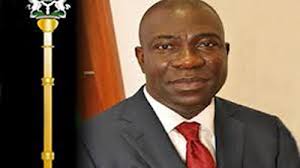President Goodluck Jonathan has agreed to sign the amendment to the 1999 Constitution after the National Assembly agreed to delete some controversial aspects objected to by the president. By this development, the president is expected to sign the bill into law today, which is his last official day in office.
The Supreme had on Wednesdsy asked both the Presidency and the National Assembly to settle out of court.
Attorney-General of the Federation and Minister of Justice, Mr. Mohammed Adoke (SAN), and the National Assembly on Wednesday filed before the Supreme Court for notice of discontinuance, putting an end to the suit filed by Adoke to challenge the final passage of the alterations into law.
The seven-man panel of the Supreme Court led by the Chief Justice of Nigeria, Justice Mahmud Mohammed struck out the suit after Adoke’s lawyer, Chief Bayo Ojo (SAN), moved the application for the discontinuance of the suit on Wednesday.
According to the terms of agreement filed with Adoke’s discontinuation notice, which was said to have been reached between the representatives of the President and the National Assembly earlier on Tuesday, the President conceded six out of his 13 initial objections to the alterations.
The agreement between the President and the National Assembly saw the removal of alteration to section 9 of the Constitution which allowed the National Assembly to dispense with the President’s assent in the process of constitution amendment.
The inserted sub-section 3(a) in section 9 had read, “For the purposes of altering the provisions of this constitution, the assent of the President shall not be required.” The President was able to stop the passage of the separation of the Attorney General of the Federation and Minster of Justice as well as the separation of the Attorney General of state from the Commissioner of Justice.
The President had refused to sign the amended constitution as proposed by the National Assembly due to the alterations to sections 8, 9, 34, 35, 39, 42, 45, 58, 84, 150, 174, 195 and 211of the 1999 Constitution. But with the settlement arrived at between the President and the National Assembly, the alterations made to sections 8, 9, 45(a) – 45(b), 150, 174, 195 and 211 will now be deleted.
The National Assembly would hence get away with their alterations to sections 34, 35, 39, 42, 58 and 84 of the constitution.
According to the agreement signed by Ojo, and the lead counsel for the National Assembly, Chief Adegboyega Awomolo (SAN), the President would sign the Fourth Constitution Alteration Act 2015, with agreement reached reflected in it.uj
The terms of settlement read, “At the meeting of the representatives of the Executive and Legislative arms of government held on Tuesday, May 26, 2015 it was agreed that the views of the President be considered and effected by deleting the following provisions of the Alteration Act 2015: “1. Alterations made to section 8 of the Principal Act on referendum in respect of state creation. “2. Alterations made to section 9 of the Principal Act dispensing with the assent of the President in the process of constitutional amendment. “3. Alterations made in sections 45(a) – 45(b) of the Act relating to Free Basic Education and Maternal Health Care Services.” “4.Alterations made to sections 150, 174, 194 and 211 of the Principal Act relating to the separation of the office of the Attorney General of the Federation and the Minister of Justice as well as the Attorney General of a state and Commissioner of Justice respectively. “5.That the suit of the Attorney General (of the Federation) in Suit No SC/214/2015 be withdrawn. “6.That the President Dr. Goodluck Ebele Jonathan, GCFR shall assent to the Fourth Constitution Alteration Act, 2015.” The alterations conceded by the President included substituting ‘the Nigeria Police Force’ in line two of Section 34(2)(b), lines three and five of section 35(7)(b) and line three of section 39(3)(b) with ‘Nigerian Police’.
The President also conceded the insertion of a new subsection 5(a) into section 58 of the 1999 constitution which empowered the National Assembly to override the President’s veto in the passage of a bill with “two-thirds” majority of members of both Houses if the President “neither signifies that he assents or that he withholds assent” within 30 days of presenting the bill to him.
President Jonathan also conceded the insertion of section 84(a) to (f)which deals with the appointment of the Accountant-General of the Federation, tenure of office and removal . The alteration empowers the President to appoint the Accountant-General of the Federation on the recommendation of the National Economic Council subject to confirmation by the Senate.














